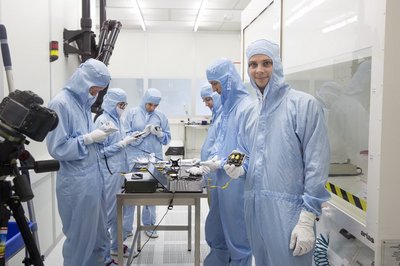After three days in the cleanroom, five students at Aarhus University have finished building their Delphini-1 satellite, which will be sent into space next year as part of the University's space programme. One of the five is Kåre Jensen, who is studying engineering science.

Space. The final frontier. How many hours have you spent gazing at the night sky with wonder? Dreamed about travelling between stars and galaxies?
The space industry, with NASA as a role model, has been a childhood dream for many. A dream that is often, however, tripped up by reality in one way or another. You have to be realistic. Don’t you? For 25-year-old Kåre Jensen, studying for an MSc in Engineering in computer technology at Aarhus University, the childhood dream is still very much alive, and it will continue to be.
He is one of the five students who have now completed Aarhus University's first satellite, Delphini-1, which is the foundation of the University's space programme; AUSAT-1.
"Ever since I started at upper secondary school, I’ve been fascinated by the space industry. I remember especially one night many years ago when I sat in front of my computer with a friend. Suddenly, his father came in and said that there was a live streaming of a rocket launch from Cape Canaveral. It was incredibly exciting to follow the launch. It was as if my interest in space took off at the same time. Then I started to follow Copenhagen Suborbitals, and later there was SpaceX," says Kåre.
His keen interest in space has been with him ever since. Therefore, ever since starting on the ICT engineer programme, Kåre has been waiting for just such a project as AUSAT-1, which, in addition to being about space and the space industry, also extends over several semesters.
"I’d really like to work with something like this in the future. And I think the possibilities are better nowadays, because the industry has been in strong growth for many years since it became significantly cheaper to send things out into space."
Kåre always knew he wanted to be an engineer. He enjoyed “solving problems” even back at primary school, as he says:
"I liked to fix people's problems and I enjoyed finding better ways of doing things. That’s exactly what engineers do; they solve problems that can change the world. The hard part was to find out what type of engineer I wanted to be."
His choice fell on ICT and this is no surprise, as electronics runs in the family. Kåre’s two older brothers are both MSc’s in engineering, one in information technology and the other in health technology. And even though Kåre’s father is a doctor, he has always been an engineer at heart, as Kåre says:
"My father started out as a radio mechanic in the heyday of B&O. He has always been interested in technology, even though at some point he made the crazy change to be a doctor. Back when my brothers went to school, our home was the only one in the neighbourhood with a computer."
Since then, the world has changed enormously. Back then, 25 years ago, Kåre lived with his family in Herning, and even though Herning is a reasonably large town, there was not a single shop where you could buy a mouse for the PC. Now, Aarhus University is building a quantum computer in the basement, and it is about to send its first satellite into orbit. All this progress is being made in the field that Kåre is about to specialise in.
And there is a need for people like Kåre in the business community. Not only in the space industry, but almost everywhere, as smart products and big data are becoming ever more important in industries that were previously completely void of digitisation. Kåre could see this too when he graduated as a Bachelor of Engineering, and before he started his two-year advanced studies for an MSc in Engineering:
"It was very tempting to go out and get a job back then. All my contemporaries were contacted by companies with job offers. Not one of those I know who stopped didn’t get a permanent job before they had completed their Bachelor’s project. That feels pretty good, and it's great to know that there are so many opportunities. But I’ve always known that I wanted to continue my studies, and my attitude has always been that no matter what happens I’ll have to work until I'm 80. So a couple of years more or less won’t make much difference," says Kåre.
Next year will offer many exciting hours with space technology for Kåre. Now that both the satellite and the base station to control the satellite have been completed, countless tests have to be run, and some of the students will be travelling to Nasa in Houston before the satellite is launched into space. And then ... then, not only the sky will be the limit.